Student file of Luther Standing Bear, a member of the Sioux Nation, who entered the school on October 6, 1879 and departed on July 6, 1885. The file contains a student information card, former student response postcards, news clippings, correspondence, a returned student survey, and a report after leaving indicating he was working as a clerk in…
Standing Bear, Luther
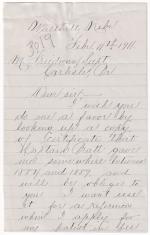
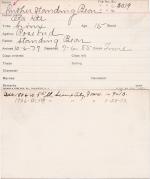
Student information card of Luther Standing Bear (Ota Kte), a member of the Sioux Nation, who entered the school on October 6, 1879 and departed on July 6, 1885. The file indicates Standing Bear was living in Sioux City, Iowa in 1913.
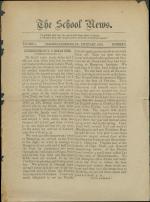
Issue nine, continues Roman Nose’s story, showing him attending Hampton School and eventually traveling to Lee, Ma. This issue’s editorial featured a piece on the hopes that the new U.S. President Garfield will put all Indian children in school. On the same page Robert W. Stewart (Creek) wrote about George Washington’s birthday. A bit about…
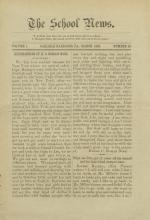
It opens with the conclusion to Roman Nose’s long journey to Carlisle. He explained how at Lee he learned to mow with a scythe and milk cows, before travelling to Carlisle Barracks, where he was happy to see other Indians following the “white man’s way”. Also on the first page is a small bit from Sophie Rachel (Nez Perces) on how she learned to…
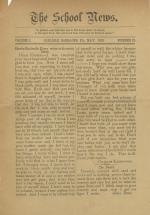
Number 12. Opened with a letter from Charles Kauboodle (Kiowa) to his cousin Laura, talking about what they’ve learned in school, their family, and wishing her a quick recovery from the sickness she has. Jessa Bent also had a few sentences on the desert published at the bottom of the page. The next page has a piece titled “Peace” about the hope…
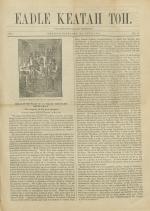
Page one opened with a piece titled “The Future of the Red Indian,” reprinted from the London Spectator. This interesting article begins with the author describing the activities of the Carlisle Indian School for a British audience before then discussing his reaction to seeing photographs from the school. The second page had the report…
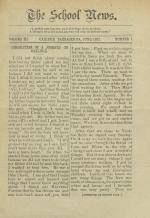
On the first page Justine A. LaFromboise describes her trip to Carlisle, explaining how her father convinced her to go get an education. The story continues on page four. On page two Ellis B. Childers (Creek) explained that he will be the editor while Charles Kihega (Iowa) visits home. C. Kihega examines the misconceptions whites and Indians…
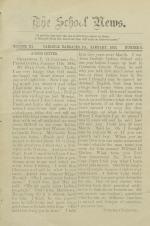
Page one was entirely taken up by a letter from Summer Riggs (Cheyenne), in which he discussed visiting friends and how a white man wanted to learn his actual name, Marchewa, in his native language. Page two mentioned issues that some Congressmen have with rules and conditions students at the school. There was also a letter from White Buffalo…
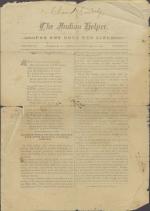
The first page opened with a poem titled “New Every Morning,” followed by "An Indian Woman Fought For Her Husband After Receiving a Beating From Him" which concluded on the fourth page. Page two gave news from the Chemawa and Genoa Indian Schools, and "A Nice Pocket Book for the Best," asking for wish lists from the trade departments. Next came…
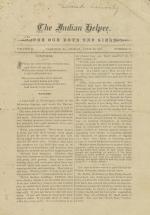
This issue opened with a poem titled “Kindness” followed by a reprint from the Word Carrier, “Manners” that compared ill-mannered behavior to animal traits and was intended as a lesson to Carlisle students. Also on that page was a paragraph reprinted from the Genoa Indian School describing a farming contest challenge between the Genoa…
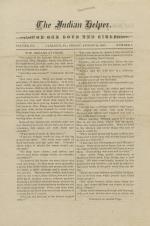
The first page continued Marianna Burgess' report of conditions at the Rosebud and Pine Ridge Sioux Agencies begun in Volume 2, including her visit to Luther Standing Bear's home. Page two reported a visit to the school by some deaf school principals who "much interested our boys with their silent ways of talking," likening manualism to Indian…
![Four male Sioux students [version 1], c.1879 Four male Sioux students [version 1], c.1879](/sites/default/files/styles/views_taxonomy/public/image-photo/Potamkin%20%2313%20%28Choate%20%2314%29%20Full%20035.jpg?itok=meJwhrDc)
Four male students posed outside a building, presumably on the school grounds. They are: Norman (Wants To Be Chief), Luther Standing Bear (Kills Plenty), Reuben Quick Bear (Kills the Enemy), and Raymond Stewart (Paints Dust).
![Four male Sioux students [version 2], c.1879 Four male Sioux students [version 2], c.1879](/sites/default/files/styles/views_taxonomy/public/image-photo/CCHS_sg0313.jpg?itok=2Y4hG4js)
Four male students posed outside a building, presumably on the school grounds. They are: Norman (Wants to be Chief), Luther Standing Bear (Kills Plenty), Reuben Quick Bear (Kills the Enemy), and Raymond Stewart (Paints Dust).
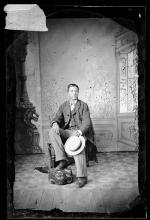
Studio portrait of Luther Standing Bear.
![Slate showing student work with name Luther Otakte [version 1], c.1880 Slate showing student work with name Luther Otakte [version 1], c.1880](/sites/default/files/styles/views_taxonomy/public/image-photo/73366.jpg?itok=mbmdbWs8)
Image of a slate such as those used by students. This slate shows a drawing of a man shooting an arrow at a bird next to a tree, math problems, the name "Luther Otakte," and an example of writing referring to teacher Miss Burgess. Along the side is written "Choate Photographer."
It is probable but not certain that all the work on…
![Slate showing student work with name Luther Otakte [version 2], c.1880 Slate showing student work with name Luther Otakte [version 2], c.1880](/sites/default/files/styles/views_taxonomy/public/image-photo/CCHS_PA-CH1_061a.jpg?itok=trqHGzjO)
Image of a slate such as those used by students. This slate shows a drawing of a man shooting an arrow at a bird next to a tree, math problems, the name "Luther Otakte," and an example of writing referring to teacher Miss Burgess. Along the side is written "Choate Photographer."
It is probable but not certain that all the work on…
![School band with Mrs. Baker [version 2], 1881 School band with Mrs. Baker [version 2], 1881](/sites/default/files/styles/views_taxonomy/public/image-photo/indian_students_brass_band_indian_training_school_APS.jpg?itok=gl4utpCN)
Portrait of twelve male students, all wearing uniforms and holding instruments, in front of the bandstand on the school grounds. In the glass plate negative version of this image [version 1] a white woman, also holding an instrument, can be seen at the far right. In the print versions of this image she is almost entirely cropped out,…
![Standing Bear and Luther Standing Bear [version 1], c.1881 Standing Bear and Luther Standing Bear [version 1], c.1881](/sites/default/files/styles/views_taxonomy/public/image-photo/NAA-73650.jpg?itok=eFBMPaYb)
Studio portrait of Standing Bear, a Sioux chief, with his son, Luther Standing Bear.
![Standing Bear and Luther Standing Bear [version 2], c.1881 Standing Bear and Luther Standing Bear [version 2], c.1881](/sites/default/files/styles/views_taxonomy/public/image-photo/0321.f.0021_alt.jpg?itok=rhyOGHri)
Studio portrait of Standing Bear, a Sioux chief, with his son, Luther Standing Bear.
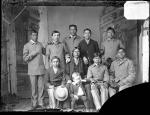
Studio portrait of a visiting chief Standing Bear with eight male students and a young white boy. His son, Luther Standing Bear, is standing behind him on the right wearing a dark coat.
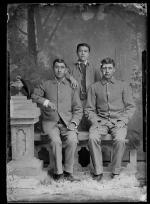
Studio portrait of Joshua Given (seated left), Luther Standing Bear (senter), and an unidentified male student, all wearing school uniforms.
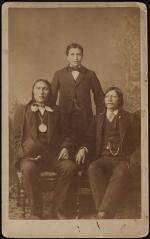
Studio portrait of Standing Bear, a Sioux chief, with his son Luther Standing Bear, and Red Fish, another Sioux chief.
The handwritten note on the reverse side reads: 1 Standing Bear, 2 Standing Bear’s Son Luther, 3 Red Fish. Sioux.
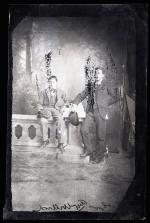
Studio portrait of Luther Standing Bear and Willard Standing Bear.
The caption reads: Luther and Willard
![Luther Standing Bear with cornet [version 1], c.1883 Luther Standing Bear with cornet [version 1], c.1883](/sites/default/files/styles/views_taxonomy/public/image-photo/NAA_73418.jpg?itok=T9dk0Sxq)
Studio portrait of Luther Standing Bear holding a cornet.
![Luther Standing Bear with cornet [version 2], c.1883 Luther Standing Bear with cornet [version 2], c.1883](/sites/default/files/styles/views_taxonomy/public/image-photo/CCHS_PA-CH2_006b.jpg?itok=qktlrNf8)
Studio portrait of Luther Standing Bear holding a cornet.
